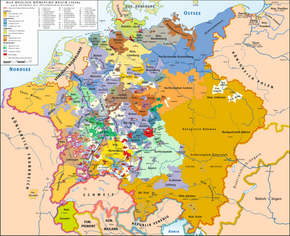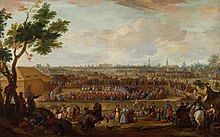Electoral Saxon foreign policy
The Electoral Saxon Foreign Policy deals with all interstate exchange processes between envoys of the Electorate of Saxony and foreign actors on a diplomatic mission in the period from 1356 to 1806.
Diplomacy after the Peace of Westphalia
The Peace of Westphalia in 1648 decisively changed the framework of the Saxon foreign policy. He gave the more powerful states of the empire, including Saxony, the de facto independence under international law . The independence in foreign policy, which was promoted by the Peace of Westphalia, led to the increased training of diplomatic missions in Saxony as well. However, these initially had the character of temporary embassies.
At the Reichstag in Regensburg, the Electoral Saxon envoy Augustin Strauch represented the interests of the Electorate of Saxony from 1653 until the Reichs Farewell in 1654. Ten years later, Strauch also took over the Electoral Saxon embassy at the Perpetual Reichstag , which, after his death in 1674, was his successor, Christoph Friedrich von Gersdorff , Anton Schott , Johann Friedrich Graf von Schönberg , Johann Georg von Ponikau and others continued until 1806.
In 1654 the imperial princes were granted the right to maintain standing armies. This enabled the princes in the empire to pursue their own goals in terms of foreign policy. As a middle power, Saxony, like Brandenburg, Bavaria and Hanover, had the goal of overcoming the precarious situation as a middle power in order not to have to tie itself to a major power . All this led to the fact that the major European powers sought the favor of these German medium-sized states and included them in their conflicts. The Reich was no longer the primary interest group for Saxon affairs.
Saxony has abstained from far-reaching foreign policy ambitions since the late reign of Elector Johann Georgs I. The electors accepted the results of the Peace of Westphalia in principle and, after 1648, largely relied on internal development.
In the 17th century, Electoral Saxony had direct relationships with some imperial princes. However, no representatives and missions were maintained at courts of European standing - except at the Viennese court . Relations with France, for example, were maintained in the second half of the 17th century by the Palatinate Council Reiffenberg .
Relations with Denmark developed as a family relationship. Family members of the Wettins were often guests there. In the middle of the 17th century, Saxony hardly had any further European relations with European powers. To Brandenburg-Prussia talked Saxon envoys and officials familiar and serene relationships that could be easily maintained by the proximity of neighbors. More intensive contacts were maintained with the Netherlands, an important international center in the 17th century. Important peace negotiations between the European powers were negotiated there. After The Hague sent Kursachsen the envoy Martin Tanck . He resided for Electoral Saxony in The Hague from 1649 to 1664. After that, the post in The Hague remained vacant for a long time. The next special envoy from Saxony was Johann Peter Werdermann (1615–1674) in 1668. A permanent representation was not yet maintained by Saxony at this time.
Saxon diplomacy up to the Silesian Wars
The territorial electors in the empire tried to improve their own rank status at the end of the 17th century and strove for the royal crown in order to be recognized as equal by the European powers. Besides Saxony, only Prussia succeeded in doing this in 1701 and a little later Hanover with the formation of the personal union Hanover-England . The ambassadorial service experienced a considerable expansion around 1700. Permanent representations ensured regular news from the individual courts and thus enabled a dense communication network between the royal rulers.
With the ambitious Poland policy under Friedrich August I from 1697, which was revealed in the same summer with the election of the elector as a king , the position of Saxony in the European hierarchy changed. Friedrich August I pursued clear foreign policy ambitions and pursued his own dynastic interests. As King of Poland, he shifted the focus of Saxon politics to Eastern Europe. Henceforth he subordinated the Saxon diplomacy to his efforts. Polish issues were also discussed through Saxon diplomats who hindered Polish institutions from performing their functions. To this end, August expanded the diplomatic network throughout Europe so that Saxon envoys were permanently represented in almost all European countries. The rise in rank of the Saxon electors led to high prestige gains, which were noticeable, for example, in peace negotiations or the enforcement of inheritance claims.
Legation reports were primarily sent to the Elector and, as a duplicate, to the Secret Council.
Saxony's rulers leaned heavily on the Habsburg empire and subsequently converted to the Catholic faith. Saxony was one of the initiators of the Great Northern War. The self-imposed great power politics of Saxony by August the Strong failed in the Great Northern War, mainly due to the war defeats against Sweden . Further expansion efforts by Saxony in Livonia and a common connection between Poland and Saxony through the incorporation of Silesia into the Wettin domain have been halted since then and through the strengthening of Brandenburg-Prussia. The unification of the two parts of Saxony and Poland as a real union , a central goal of the Saxon electors since 1697, failed due to the difference in approach between the two countries. After the death of August, the Saxon adventures on the big European stage put a heavy burden on the state finances.
It turned out that Saxony, which in a strategically important location between the neighboring Prussia and Habsburg, got between the fronts more and more often and after 1740 was no longer able to get out of this dangerous situation. The attack of the Polish crown on Saxony had intensified the competitive relationship between the Electorate of Saxony and Brandenburg , because Prussia's kings strove to acquire West Prussia as a bridge between the Prussian kingship and the rest of the territories at Poland's expense.
After the death of August the Strong, Prime Minister Heinrich von Brühl took control of Saxony's foreign affairs.
literature
- René Hanke: Brühl and the Renversement des alliances: the anti-Prussian foreign policy, of the Dresden court 1744–1756. Lit, Berlin / Münster 2006, ISBN 978-3-8258-9455-9 .
Individual evidence
- ^ Albrecht Klose, Klaus-Peter Rueß: The grave inscriptions on the ambassador's cemetery in Regensburg . Regensburg Studies, Vol. 22. Regensburg City Archives, Regensburg 2015. ISBN 978-3-943222-13-5 , p. 94ff, p. 20, p. 79, p. 22
- ^ Daniel Legutke: Diplomacy as a social institution, p. 81.
- ^ Daniel Legutke: Diplomacy as a social institution, p. 91.
- ↑ René Hanke: Brühl and the Renversement des alliances: the anti-Prussian foreign policy, of the Dresden court 1744-1756, p. 14.
- ↑ René Hanke: Brühl and the Renversement des alliances: the anti-Prussian foreign policy, of the Dresden court 1744-1756, p. 15.
- ↑ Rex Rexheuser: Staff Unions of Saxony-Poland 1697-1763 and Hanover-England 1714-1837: A Comparison, Otto Harrassowitz Verlag, 2005, pp 138th
- ↑ René Hanke: Brühl and the Renversement des alliances: the anti-Prussian foreign policy, of the Dresden court 1744-1756, p. 17.
- ↑ René Hanke: Brühl and the Renversement des alliances: the anti-Prussian foreign policy, of the Dresdener Hof 1744-1756, p. 29.
- ↑ René Hanke: Brühl and the Renversement des alliances: the anti-Prussian foreign policy, of the Dresdener Hof 1744-1756, p. 20.


